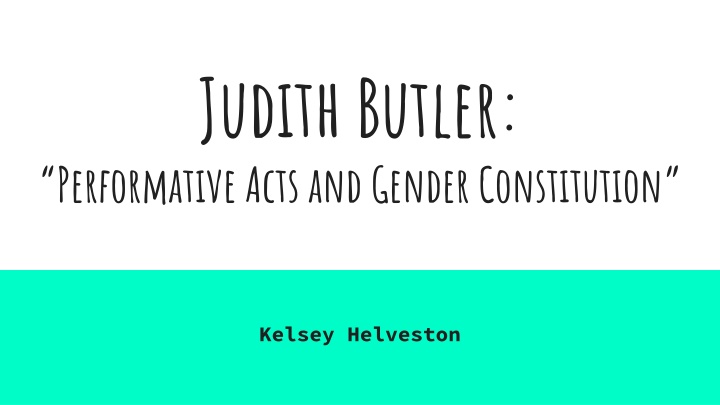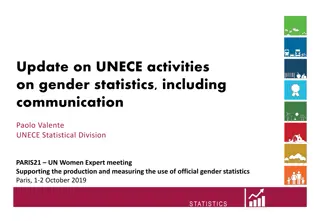
Judith Butler's Theory of Gender Performativity
Explore Judith Butler's groundbreaking theory that gender is not inherent but rather constructed through performative acts. Learn how societal norms influence our understanding of gender, challenging traditional binaries and emphasizing the fluidity and variability of gender identity.
Download Presentation

Please find below an Image/Link to download the presentation.
The content on the website is provided AS IS for your information and personal use only. It may not be sold, licensed, or shared on other websites without obtaining consent from the author. If you encounter any issues during the download, it is possible that the publisher has removed the file from their server.
You are allowed to download the files provided on this website for personal or commercial use, subject to the condition that they are used lawfully. All files are the property of their respective owners.
The content on the website is provided AS IS for your information and personal use only. It may not be sold, licensed, or shared on other websites without obtaining consent from the author.
E N D
Presentation Transcript
Judith Butler: Performative Acts and Gender Constitution Kelsey Helveston
Judith Butler Professor of Comparative Literature and Rhetoric at UC Berkeley since 1993 Philosophy, Feminist Theory, Gender Theory, Queer Theory Focuses on power, gender, sexuality, identity Best Known for: Gender Trouble (1990) Bodies That Matter (1993) Major influence in academia and political activism1
Lets Talk About Binaries We are taught that Butler Opposites, but not always equal opposites Definitions of binaries change over time and by culture Reinforce hierarchy and power structures Not opposites Can t have one without the other Continuum2
1988: Performative Acts and Gender Constitution Gender is performative Through performative acts, we become Gender is separate from biological sex Gender is not natural; it is socially constructed But we think it s natural because of gender norms Gender varies by time period and culture Gender categories and oppression Binaries: heterosexual v. homosexual Gender performativeness is not gender expression Gender is something you do, not something you are.3
1990: Imitation and Gender Insubordination Sexuality on a continuum (Foucault) Totalization of I Gender categories Gender is performative No one is 100% anything Gender is not biological or natural Gender definitions vary by time period and culture Binaries: heterosexual v. homosexual4
Butler Explains Performing v. Performative5 Judith Butler: Your Behavior Creates Your Gender http://bigthink.com Nobody is born one gender or the other, says the philosopher. "We act and walk and speak and talk in ways that consolidate an impression of being a man or being a woman." Question: What does it mean that gender is performative? Judith Butler: It's one thing to say that gender is performed and that is a little different from saying gender is performative. When we say gender is performed we usually mean that we've taken on a role or we're acting in some way and that our acting or our role playing is crucial to the gender that we are and the gender that we present to the world. To say that gender is performative is a little different because for something to be performative means that it produces a series of effects. We act and walk and speak and talk in ways that consolidate an impression of being a man or being a woman. I was walking down the street in Berkeley when I first arrived several years ago and a young woman who was I think in high school leaned out of her window and she yelled, "Are you a lesbian?", and she was looking to harass me or maybe she was just freaked out or she thought I looked like I probably was one or wanted to know and I thought to myself well I could feel harassed or stigmatized, but instead I just turned around and I said yes I am and that really shocked her. We act as if that being of a man or that being of a women is actually an internal reality or something that is simply true about us, a fact about us, but actually it's a phenomenon that is being produced all the time and reproduced all the time, so to say gender is performative is to say that nobody really is a gender from the start. I know it's controversial, but that's my claim. Question: How should this notion of gender performativity change the way we look at gender? Judith Butler: Think about how difficult it is for sissy boys or how difficult it is for tomboys to function socially without being bullied or without being teased or without sometimes suffering threats of violence or without their parents intervening to say maybe you need a psychiatrist or why can't you be normal. So there are institutional powers like psychiatric normalization and there are informal kinds of practices like bullying which try to keep us in our gendered place. I think there is a real question for me about how such gender norms get established and policed and what the best way is to disrupt them and to overcome the police function. It's my view that gender is culturally formed, but it's also a domain of agency or freedom and that it is most important to resist the violence that is imposed by ideal gender norms, especially against those who are gender different, who are nonconforming in their gender presentation. Recorded January 13, 2011Interviewed by Max MillerDirected by Jonathan FowlerProduced by Elizabeth Rodd
Gender Categories Not just male/female Queer category Cisgender v. non-conforming Think LGBTQ+ Whole community advocating for acknowledgment Social media Protests Non-discriminatory laws Gender-neutral pronouns6
NYC Human Rights Law Issued in December 2015 Not news until spring 2016 Specifically in NYC Can t discriminate on the basis of gender identity or expression Released list of 31 gender identities Encourages use of preferred pronouns7
Works Cited 1. 2. 3. Theory.org.uk. "Judith Butler." Theory.org.uk. Theory.org.uk, n.d. Web. 31 Jul. 2016. <http://www.theory.org.uk/ctr-butl.htm>. Vetter, Lara. Gender and Sexuality. UNC Charlotte. Charlotte, NC. 30 Mar. 2016. Class discussion. Butler, Judith. "Performative Acts and Gender Constitution: An Essay in Phenomenology and Feminist Theory." Theatre Journal 40.4 (Dec. 1988): pp. 519-531. Web. 31 Jul. 2016. Butler, Judith. Imitation and Gender Insubordination. The Lesbian and Gay Studies Reader. Eds. Henry Abelove, Mich le Aina Barale, and David M. Halperin. New York: Routledge, 1993. 307-320. Web. 31 Jul. 2016. Big Think. Judith Butler: Your Behavior Creates Your Gender. Online video. YouTube. YouTube, 6 Jun. 2011. Web. 31 Jul. 2016. Neverfearqueerishere. Neverfearqueerishere. Instagram. Instagram, 2016. Web. 31 Jul. 2016. Hasson, Peter. "New York City Lets You Choose From 31 Different Gender Identities." The Daily Caller. The Daily Caller, 24 May 2016. Web. 01 Aug. 2016. NYC Commission on Human Rights. "Gender ID Card." (n.d.): n. pag. Nyc.gov. NYC Commission on Human Rights. Web. 31 July 2016. <http://www.nyc.gov/html/cchr/downloads/pdf/publications/GenderID_Card2015.pdf>. 4. 5. 6. 7. 8.






















